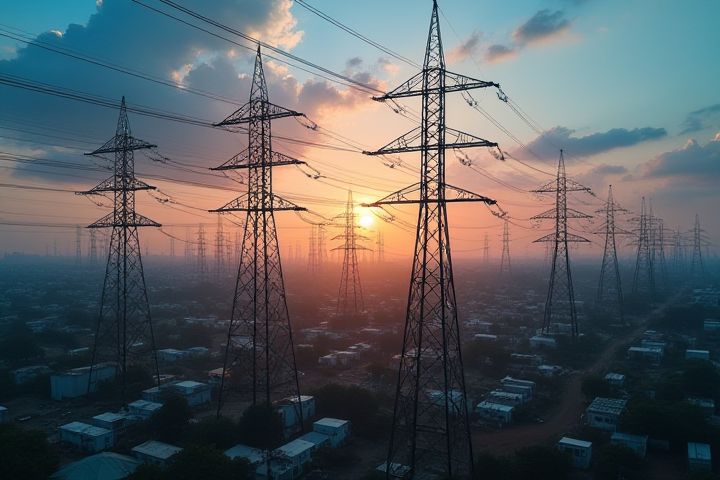
Nigeria's power sector plays a crucial role in the country's economic development, with the generation capacity primarily derived from natural gas and hydroelectric sources. The Power Holding Company of Nigeria (PHCN) was restructured to encourage private investments through the privatization of generation and distribution companies, enhancing efficiency and service delivery. Despite significant reforms, challenges such as inadequate infrastructure, regulatory issues, and frequent power outages persist, impacting industries and households alike. Renewable energy projects, including solar and wind initiatives, are gaining momentum, aiming to diversify the energy mix and provide sustainable alternatives. Engaging in local and international partnerships can further catalyze improvements in energy access and reliability for millions of Nigerians.
National Grid Challenges
The power sector in Nigeria faces significant challenges related to the national grid, impacting energy distribution and reliability. Frequent outages and transmission losses result from inadequate infrastructure and maintenance, hindering access to electricity for millions. Investments in renewable energy sources, such as solar and wind, are increasingly viewed as essential to augment the grid and improve energy access. By enhancing grid stability, you can contribute to a sustainable and efficient power sector that meets the growing demand for electricity across the nation.
Electricity Supply Gaps
The power sector in Nigeria faces significant electricity supply gaps, hindering economic growth and development. With an installed capacity of approximately 13,000 megawatts, actual electricity generation often falls short of demand, which exceeds 25,000 megawatts. This disparity results in frequent outages, affecting households and industries alike, ultimately impeding productivity and investment. Efforts to improve infrastructure, expand renewable energy sources, and increase regulatory efficiency are crucial to bridging these gaps and enhancing overall energy access.
Generation Capacity
Nigeria's power sector is characterized by a significant focus on boosting generation capacity to meet the increasing energy demand of its growing population and economy. As of October 2023, the country's total installed capacity stands at approximately 13,000 megawatts, yet actual generation often falls short due to infrastructural challenges and inefficiencies. Investments in renewable energy sources, such as solar and wind, are gaining traction, aiming to diversify energy production and reduce reliance on fossil fuels. Upgrading transmission and distribution networks is crucial for ensuring that generated electricity reaches consumers effectively, ultimately supporting national development and enhancing the quality of life.
Distribution Companies (Discos)
The Nigerian power sector is largely characterized by its distribution companies (Discos), responsible for delivering electricity to end-users and managing the last mile of the power supply chain. These entities face numerous challenges, including infrastructural deficits, billing inefficiencies, and inadequate regulatory frameworks, which hinder their operational effectiveness. As a consumer, understanding the role of Discos can help you navigate issues like power outages, tariff changes, and service complaints more effectively. Government initiatives and private sector investments are crucial to revitalizing Discos, enhancing service delivery, and ultimately ensuring a more stable electricity supply across Nigeria.
Transmission Infrastructure Issues
The power sector in Nigeria faces significant challenges related to transmission infrastructure, which has hindered efficient electricity distribution across the nation. Inadequate transmission lines and substation capacity lead to frequent power outages and supply instability, affecting both residential and industrial users. To improve the situation, investments in modernizing and expanding the transmission network are essential, fostering greater access to reliable electricity and supporting economic growth. Your engagement with policy advocacy and private sector partnerships can help drive initiatives aimed at overcoming these critical infrastructure barriers.
Renewable Energy Potential
Nigeria possesses significant renewable energy potential, particularly in solar, wind, and hydropower resources. The country's abundant sunlight, with an average irradiation of 5.5 kWh/m2 daily, makes solar energy a viable option for increasing electricity access, especially in remote areas. Wind energy, primarily in the northern regions, shows promise with average wind speeds exceeding 4 m/s, suitable for harnessing energy. The government is actively promoting policies and incentives to harness these resources, positioning Nigeria as a key player in the African renewable energy landscape.
Power Sector Reforms
The Power Sector in Nigeria has undergone significant reforms aimed at enhancing electricity generation, transmission, and distribution. Key initiatives include the unbundling of the Power Holding Company of Nigeria (PHCN) into various successor companies, fostering competition and private sector investment. The Nigerian Electricity Regulatory Commission (NERC) has implemented tariff adjustments and regulatory frameworks to ensure efficiency and sustainability. To meet the growing energy demands, the integration of renewable energy sources into the national grid is becoming increasingly essential for achieving energy security and economic growth.
Privatization Efforts
The power sector in Nigeria has undergone significant privatization efforts aimed at improving electricity supply and infrastructure. Since the privatization of over 18 electricity distribution and generation companies in 2013, there has been a focus on increasing efficiency and attracting private investment. Challenges such as inadequate regulatory frameworks and underfunded infrastructure persist, impacting the overall effectiveness of these privatization reforms. Your engagement with the sector could enhance understanding of ongoing developments and investment opportunities in renewable energy and power generation technologies.
Regulatory Framework
The power sector in Nigeria operates under a regulatory framework established by the Nigerian Electricity Regulatory Commission (NERC), which ensures compliance with industry standards. This framework promotes transparency, accountability, and efficiency in electricity generation, distribution, and transmission. Electricity tariffs are regulated to protect consumer rights while attracting investment in infrastructure. By fostering an environment for private sector participation and encouraging competition, the framework aims to address the challenges of electricity supply and enhance access for all Nigerians.
Rural Electrification Initiatives
The power sector in Nigeria emphasizes rural electrification initiatives to enhance energy access for underserved communities. With a significant portion of the population lacking reliable electricity, various government and non-governmental programs aim to deploy renewable energy solutions, such as solar panels and microgrid systems. These initiatives not only provide essential services but also foster local economic development through job creation and increased productivity. Sustainable rural electrification is crucial for improving living standards and supporting Nigeria's overall economic growth.
